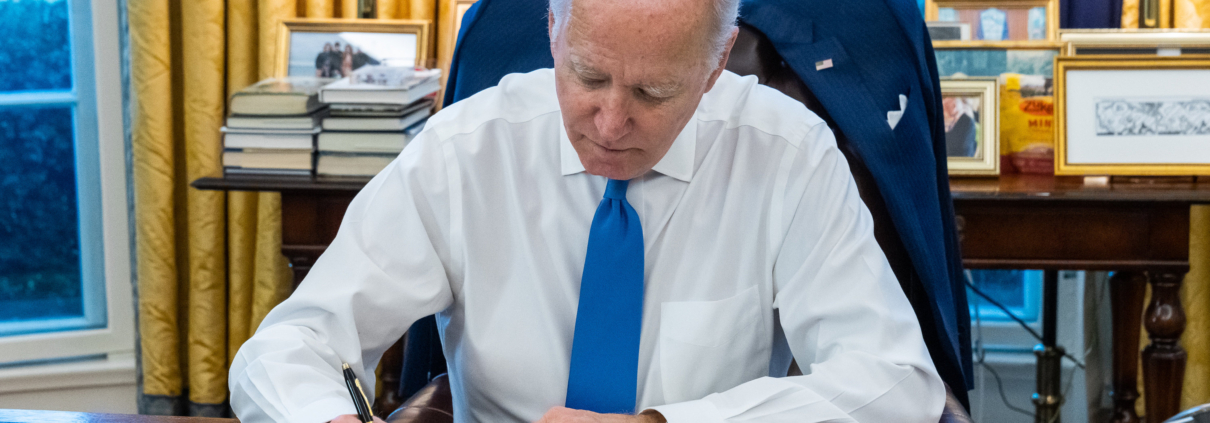The Phone and Pen Are Back
Here’s What You Need to Know
When Congressional Republicans frustrated President Barack Obama’s agenda, he bluntly declared, “I’ve got a pen, and I’ve got a phone,” with which he pledged “to sign executive orders and take … administrative actions that move the ball forward.” With at least one chamber of Congress expected to shift to GOP hands, President Joe Biden will find himself with a similar predicament, and if his first year in office is any indication, he is not waiting to wield his phone and pen in ways that impact a wide range of businesses.
Biden has issued more than 100 executive orders since taking office – including more in his first year than any president since Gerald Ford – and that does not count numerous administrative actions taken by various federal agencies. Come January, with Republicans likely to gain control of the U.S. House and possibly the Senate, that number is all-but-assured to grow exponentially. Here’s what public affairs professionals need to know to anticipate how these actions could impact their interests.
How Biden May Put His Phone and Pen to Work
Declare A Climate Emergency. Even after passage of the Inflation Reduction Act, climate activists and members of Congress are pressuring Biden to issue an emergency declaration on climate change, which would allow the president to (1) halt crude oil exports, (2) limit oil and gas drilling in federal waters, and (3) direct agencies including the Federal Emergency Management Agency to boost renewable-energy sources.
Subscribe to Receive Insights
"*" indicates required fields
Seize The Means of Energy Production. With gas prices rising, Biden has indicated he may invoke the Defense Production Act (DPA) in an effort to boost the U.S.’s oil-refining capacity, a hammer he has already wielded against the energy sector in other ways.
Extend The COVID Emergency. The COVID-19 Public Health Emergency (PHE) is set to expire on January 11, 2023, after the Administration extended it for the seventh time last week. With Congressional Republicans likely to scrutinize his pandemic response, particularly after Biden declared the pandemic “over,” and without another extension the PHE’s relaxation of many regulations could come to an end even as senior health officials seek additional funding to fight the virus.
Pressure States and Companies on The Culture Wars. Covid is not the only culture clash likely to see executive action. Under pressure from abortion rights activists, Biden could double down on commitments by his Task Force on Reproductive Healthcare Access, including the possibility he could declare a public health emergency on abortion access. Biden could also pressure states through Medicaid and other funding mechanisms to cover abortion access, leaving care providers, insurers, and employers caught between federal and state health officials. Biden may take similar action to ensure access to “gender-affirming care.
Forcing Social Impact on Financial Services Sector. More executives could see their compensation tied to how well their company is doing on environmental, social and governance (ESG) goals – with an emphasis on the environmental – if the Securities & Exchange Commission finalizes its Climate Disclosure Rule. Furthermore, the Department of Labor proposed a rule in October 2021 that could compel ERISA plan fiduciaries to incorporate more ESG investing, and in February issued a request for information seeking input from stakeholders about whether the agency should add climate-risk questions to Form 5500, the form plans are required to submit annually. Plan fiduciaries and other stakeholders may be impacted by the final rules and policy pronouncements that come from these actions.
“Ungigging” The Economy. Biden faces growing pressure from gig economy workers and labor unions to follow through on his 2020 campaign pledge to “Ensure workers in the ‘gig economy’ and beyond receive the legal benefits and protections they deserve.” That pledge could lead to executive action forcing companies like Uber, Lyft, and DoorDash to classify drivers as employees rather than independent contractors.
Return Of the Joint Employer Rule. Biden is also facing demands from unions and labor activists to broaden the legal test for determining when a company jointly employs franchise workers – something the Obama Administration attempted to do before courts stepped in. Biden’s National Labor Relations Board recently proposed a rule to broaden the joint employment relationship to include indirect and unexercised control over the terms and conditions of a job.
Increased Executive Actions Will Leave Businesses Fighting a Two-Front War in Washington
As we noted last month, a Republican takeover of at least one and possibly both chambers of Congress will bring new pressures and scrutiny to companies and industries that populists in the GOP view with increased skepticism. As Republicans launch investigations likely to hit a wide range of industries, President Biden will be counteracting Congressional intransigence with executive action, often leaving it to courts to sort out conflicting policy directions. Public affairs professionals cannot wait to prepare for this new landscape in which they will have to satisfy competing demands from each end of Pennsylvania Avenue. If you need help assessing these risks and which stakeholders are likely to influence them, feel free to contact us.
 https://twitter.com/POTUS/status/1495911308625125380/photo/1
https://twitter.com/POTUS/status/1495911308625125380/photo/1

